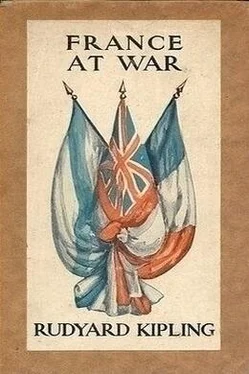Rudyard Kipling - France at War
Здесь есть возможность читать онлайн «Rudyard Kipling - France at War» весь текст электронной книги совершенно бесплатно (целиком полную версию без сокращений). В некоторых случаях можно слушать аудио, скачать через торрент в формате fb2 и присутствует краткое содержание. Год выпуска: 2014, Издательство: epubBooks Classics, Жанр: Биографии и Мемуары, prose_military, на английском языке. Описание произведения, (предисловие) а так же отзывы посетителей доступны на портале библиотеки ЛибКат.
- Название:France at War
- Автор:
- Издательство:epubBooks Classics
- Жанр:
- Год:2014
- ISBN:нет данных
- Рейтинг книги:4 / 5. Голосов: 1
-
Избранное:Добавить в избранное
- Отзывы:
-
Ваша оценка:
- 80
- 1
- 2
- 3
- 4
- 5
France at War: краткое содержание, описание и аннотация
Предлагаем к чтению аннотацию, описание, краткое содержание или предисловие (зависит от того, что написал сам автор книги «France at War»). Если вы не нашли необходимую информацию о книге — напишите в комментариях, мы постараемся отыскать её.
and
.
France at War — читать онлайн бесплатно полную книгу (весь текст) целиком
Ниже представлен текст книги, разбитый по страницам. Система сохранения места последней прочитанной страницы, позволяет с удобством читать онлайн бесплатно книгу «France at War», без необходимости каждый раз заново искать на чём Вы остановились. Поставьте закладку, и сможете в любой момент перейти на страницу, на которой закончили чтение.
Интервал:
Закладка:
"What is the tune?" I asked of an officer beside me.
"My faith, I can't recall for the moment. I've marched to it often enough, though. 'Sambre–et–Meuse,' perhaps. Look! There goes my battalion! Those Chasseurs yonder."
He knew, of course; but what could a stranger identify in that earth–shaking passage of thirty thousand?
ARTILLERY AND CAVALRY
The note behind the ridge changed to something deeper.
"Ah! Our guns," said an artillery officer, and smiled tolerantly on the last blue waves of the Line already beating toward the horizon.
They came twelve abreast—one hundred and fifty guns free for the moment to take the air in company, behind their teams. And next week would see them, hidden singly or in lurking confederacies, by mountain and marsh and forest, or the wrecked habitations of men—where?
The big guns followed them, with that long–nosed air of detachment peculiar to the breed. The Gunner at my side made no comment. He was content to let his Arm speak for itself, but when one big gun in a sticky place fell out of alignment for an instant I saw his eyebrows contract. The artillery passed on with the same inhuman speed and silence as the Line; and the Cavalry's shattering trumpets closed it all.
They are like our Cavalry in that their horses are in high condition, and they talk hopefully of getting past the barbed wire one of these days and coming into their own. Meantime, they are employed on "various work as requisite," and they all sympathize with our rough–rider of Dragoons who flatly refused to take off his spurs in the trenches. If he had to die as a damned infantryman, he wasn't going to be buried as such. A troop–horse of a flanking squadron decided that he had had enough of war, and jibbed like Lot's wife. His rider (we all watched him) ranged about till he found a stick, which he used, but without effect. Then he got off and led the horse, which was evidently what the brute wanted, for when the man remounted the jibbing began again. The last we saw of him was one immensely lonely figure leading one bad but happy horse across an absolutely empty world. Think of his reception—the sole man of 40,000 who had fallen out!
THE BOCHE AS MR. SMITH
The Commander of that Army Corps came up to salute. The cars went away with the Generals and the Minister for War; the Army passed out of sight over the ridges to the north; the peasant women stooped again to their work in the fields, and wet mist shut down on all the plain; but one tingled with the electricity that had passed. Now one knows what the solidarity of civilization means. Later on the civilized nations will know more, and will wonder and laugh together at their old blindness. When Lord Kitchener went down the line, before the march past, they say that he stopped to speak to a General who had been Marchand's Chief of Staff at the time of Fashoda. And Fashoda was one of several cases when civilization was very nearly maneuvered into fighting with itself "for the King of Prussia," as the saying goes. The all–embracing vileness of the Boche is best realized from French soil, where they have had large experience of it. "And yet," as some one observed, "we ought to have known that a race who have brought anonymous letter–writing to its highest pitch in their own dirty Court affairs would certainly use the same methods in their foreign politics. Why didn't we realize?"
"For the same reason," another responded, "that society did not realize that the late Mr. Smith, of your England, who married three wives, bought baths in advance for each of them, and, when they had left him all their money, drowned them one by one."
"And were the baths by any chance called Denmark, Austria, and France in 1870?" a third asked.
"No, they were respectable British tubs. But until Mr. Smith had drowned his third wife people didn't get suspicious. They argued that 'men don't do such things.' That sentiment is the criminal's best protection."
IV
The Spirit of the People
We passed into the zone of another army and a hillier country, where the border villages lay more sheltered. Here and there a town and the fields round it gave us a glimpse of the furious industry with which France makes and handles material and troops. With her, as with us, the wounded officer of experience goes back to the drill–ground to train the new levies. But it was always the little crowded, defiant villages, and the civil population waiting unweariedly and cheerfully on the unwearied, cheerful army, that went closest to the heart. Take these pictures, caught almost anywhere during a journey: A knot of little children in difficulties with the village water–tap or high–handled pump. A soldier, bearded and fatherly, or young and slim and therefore rather shy of the big girls' chaff, comes forward and lifts the pail or swings the handle. His reward, from the smallest babe swung high in air, or, if he is an older man, pressed against his knees, is a kiss. Then nobody laughs.
Or a fat old lady making oration against some wicked young soldiers who, she says, know what has happened to a certain bottle of wine. "And I meant it for all—yes, for all of you —this evening, instead of the thieves who stole it. Yes, I tell you—stole it!" The whole street hears her; so does the officer, who pretends not to, and the amused half–battalion up the road. The young men express penitence; she growls like a thunderstorm, but, softening at last, cuffs and drives them affectionately before her. They are all one family.
Or a girl at work with horses in a ploughed field that is dotted with graves. The machine must avoid each sacred plot. So, hands on the plough–stilts, her hair flying forward, she shouts and wrenches till her little brother runs up and swings the team out of the furrow. Every aspect and detail of life in France seems overlaid with a smooth patina of long–continued war—everything except the spirit of the people, and that is as fresh and glorious as the sight of their own land in sunshine.
A CITY AND WOMAN
We found a city among hills which knew itself to be a prize greatly coveted by the Kaiser. For, truly, it was a pleasant, a desirable, and an insolent city. Its streets were full of life; it boasted an establishment almost as big as Harrod's and full of buyers, and its women dressed and shod themselves with care and grace, as befits ladies who, at any time, may be ripped into rags by bombs from aeroplanes. And there was another city whose population seemed to be all soldiers in training; and yet another given up to big guns and ammunition —an extraordinary sight.
After that, we came to a little town of pale stone which an Army had made its headquarters. It looked like a plain woman who had fainted in public. It had rejoiced in many public institutions that were turned into hospitals and offices; the wounded limped its wide, dusty streets, detachments of Infantry went through it swiftly; and utterly bored motor–lorries cruised up and down roaring, I suppose, for something to look at or to talk to. In the centre of it I found one Janny, or rather his marble bust, brooding over a minute iron–railed garden of half–dried asters opposite a shut–up school, which it appeared from the inscription Janny had founded somewhere in the arid Thirties. It was precisely the sort of school that Janny, by the look of him, would have invented. Not even French adaptability could make anything of it. So Janny had his school, with a faint perfume of varnish, all to himself in a hot stillness of used–up air and little whirls of dust. And because that town seemed so barren, I met there a French General whom I would have gone very far to have encountered. He, like the others, had created and tempered an army for certain work in a certain place, and its hand had been heavy on the Boche. We talked of what the French woman was, and had done, and was doing, and extolled her for her goodness and her faith and her splendid courage. When we parted, I went back and made my profoundest apologies to Janny, who must have had a mother. The pale, overwhelmed town did not now any longer resemble a woman who had fainted, but one who must endure in public all manner of private woe and still, with hands that never cease working, keeps her soul and is cleanly strong for herself and for her men.
Читать дальшеИнтервал:
Закладка:
Похожие книги на «France at War»
Представляем Вашему вниманию похожие книги на «France at War» списком для выбора. Мы отобрали схожую по названию и смыслу литературу в надежде предоставить читателям больше вариантов отыскать новые, интересные, ещё непрочитанные произведения.
Обсуждение, отзывы о книге «France at War» и просто собственные мнения читателей. Оставьте ваши комментарии, напишите, что Вы думаете о произведении, его смысле или главных героях. Укажите что конкретно понравилось, а что нет, и почему Вы так считаете.












